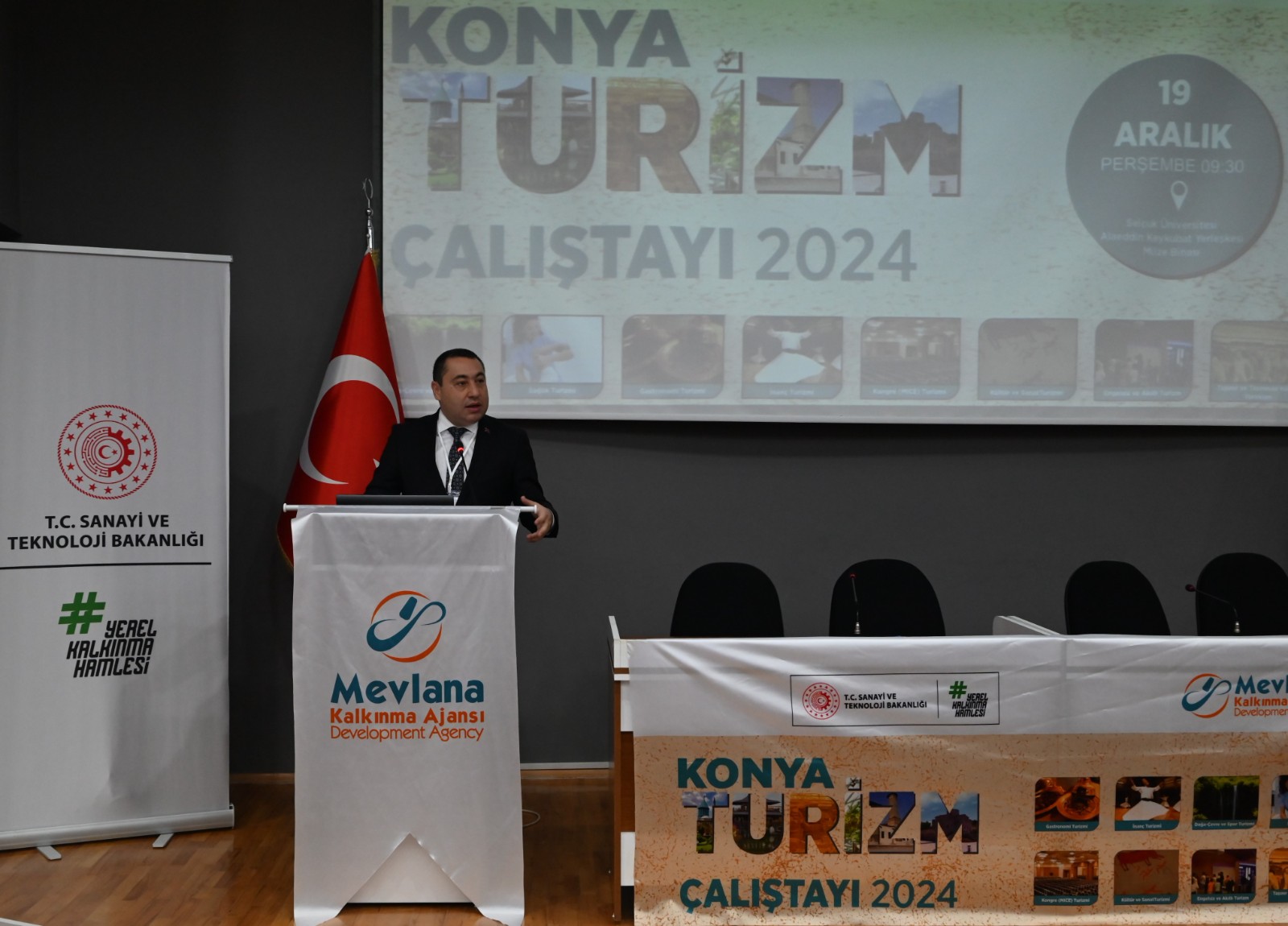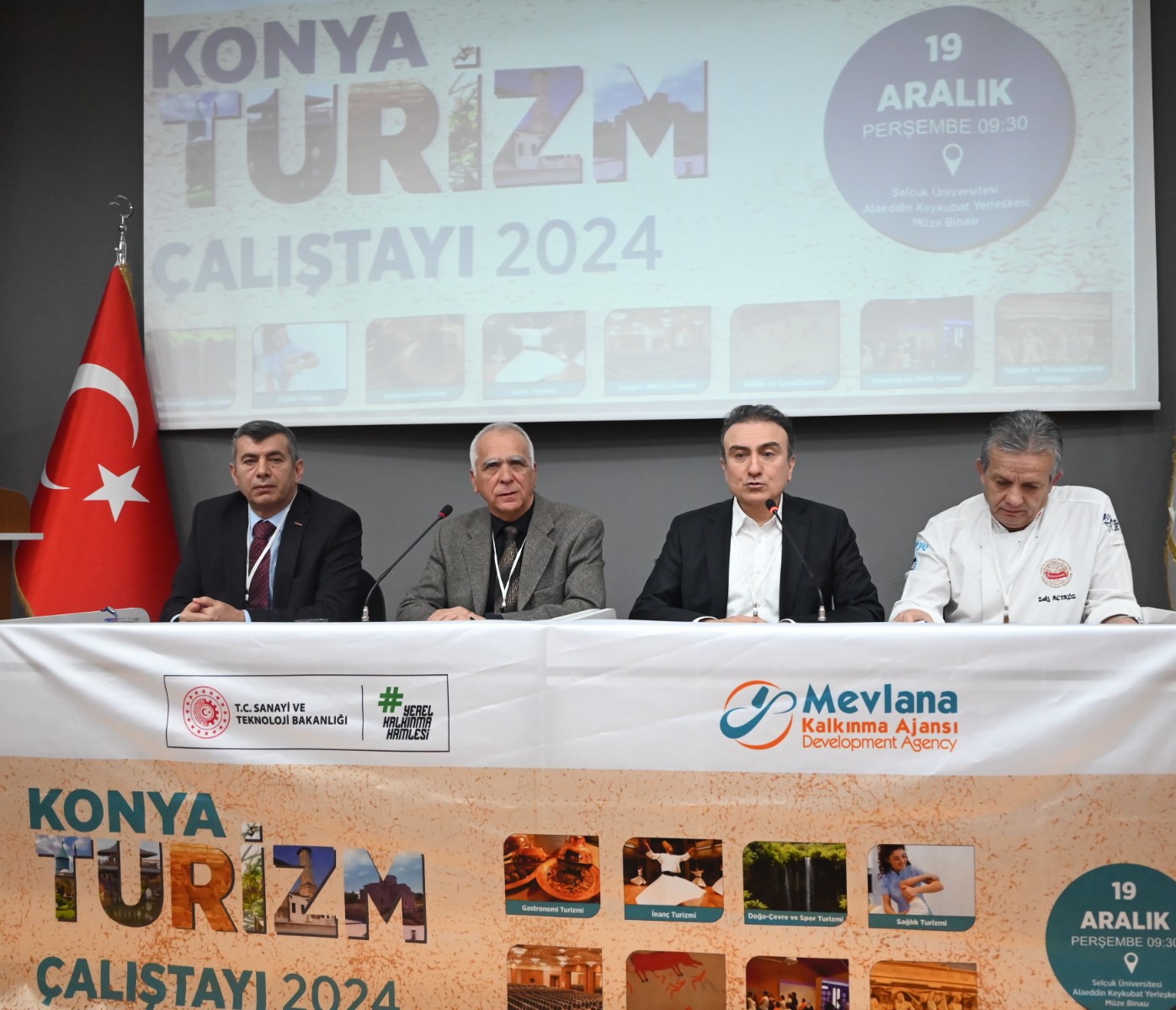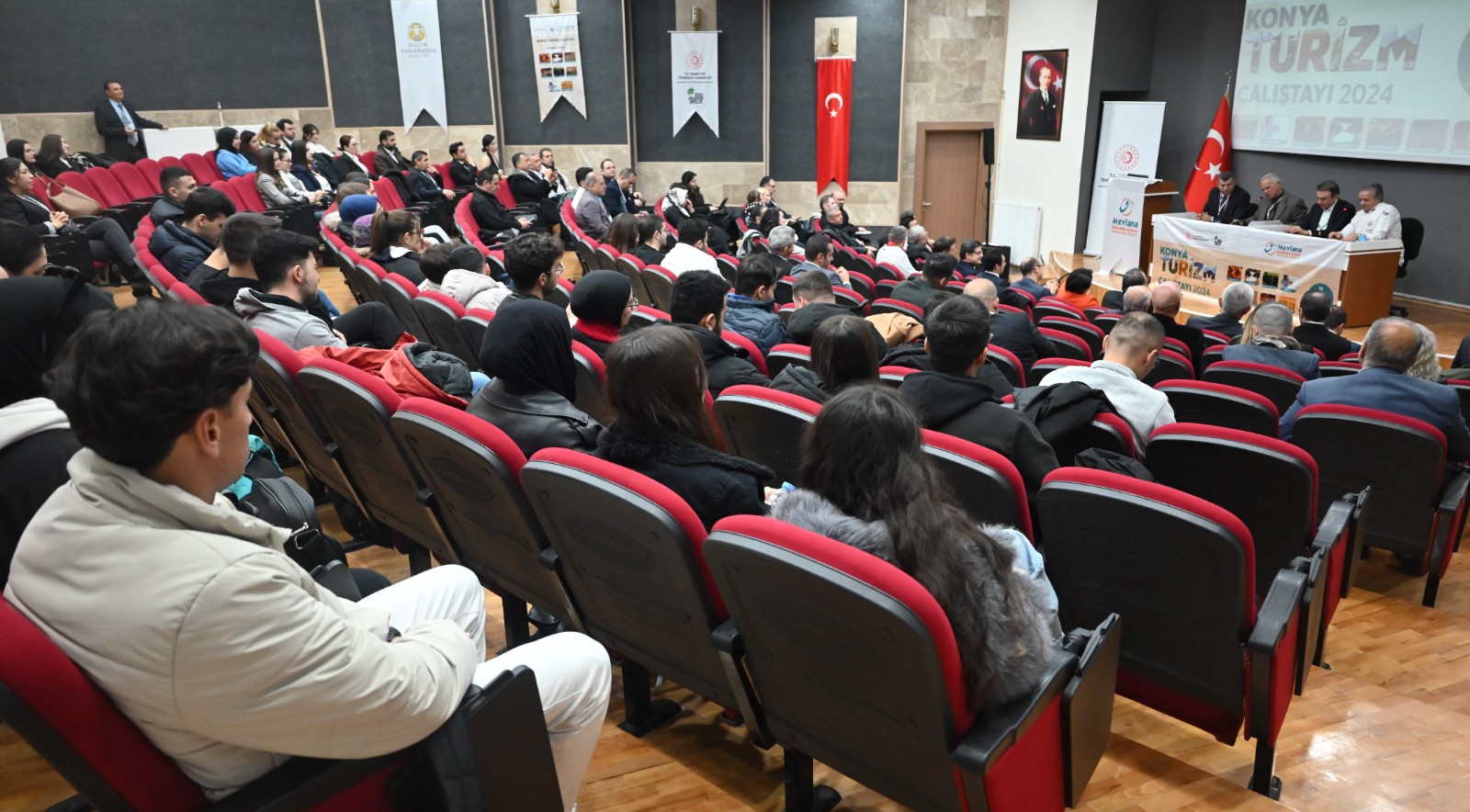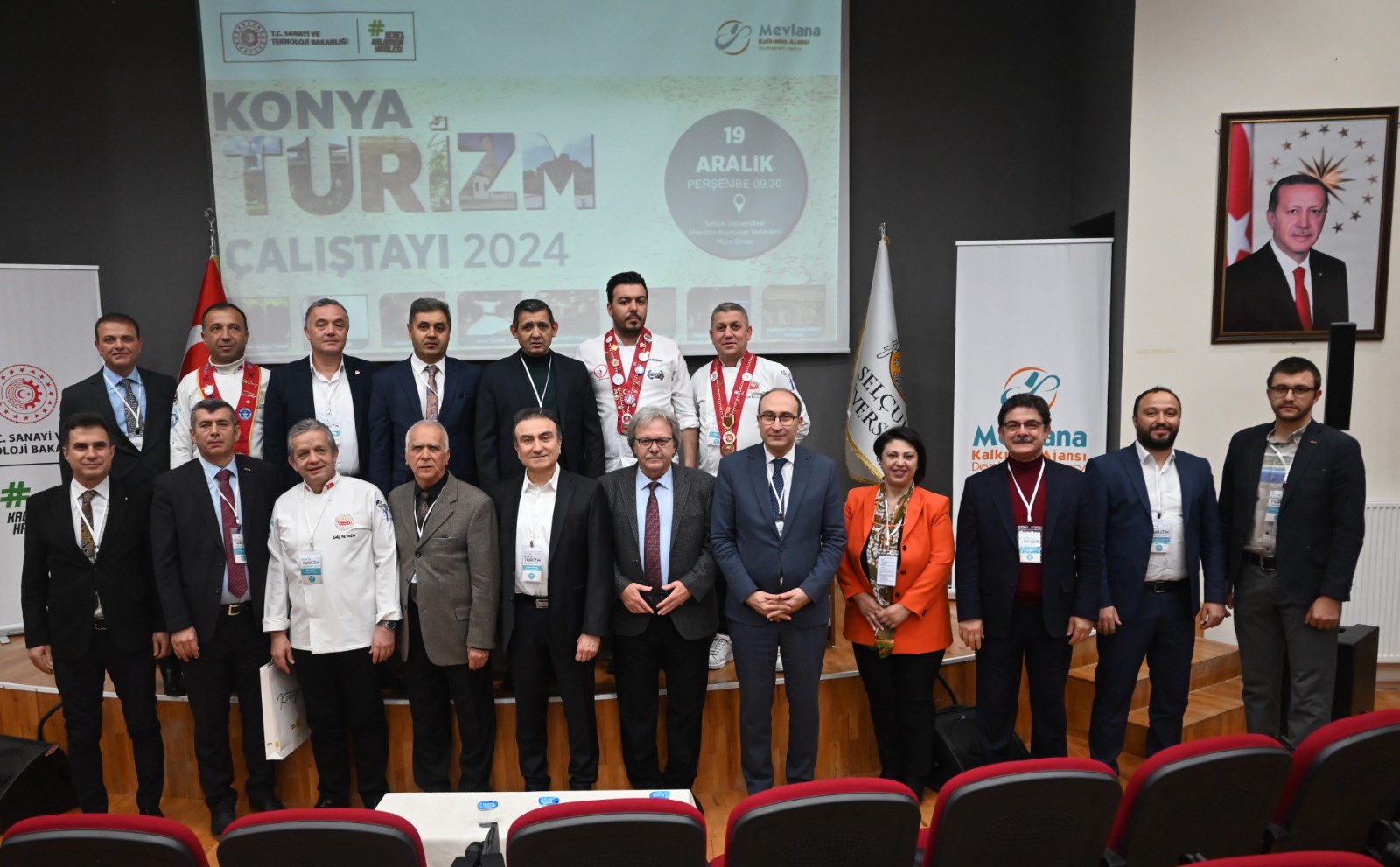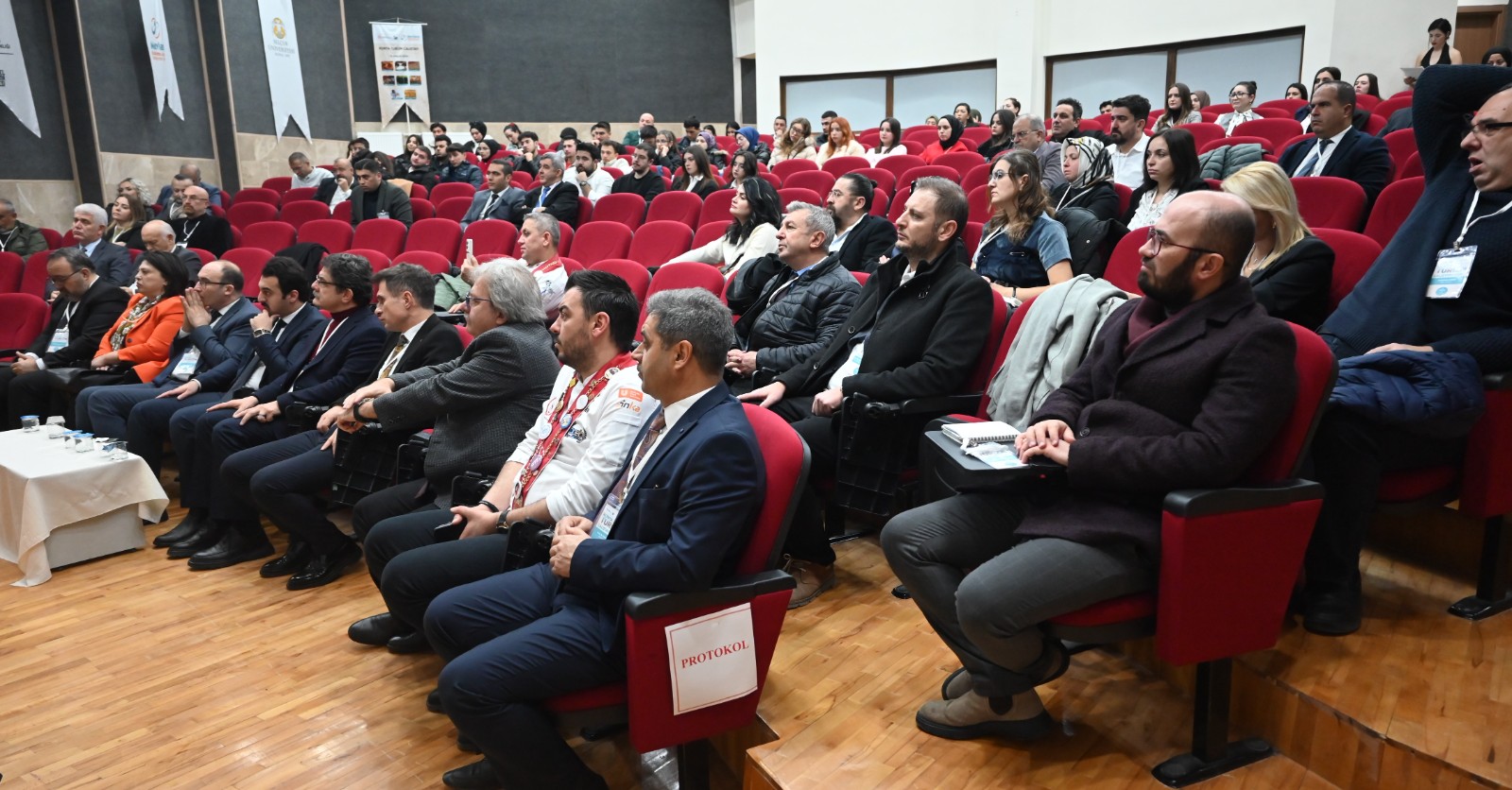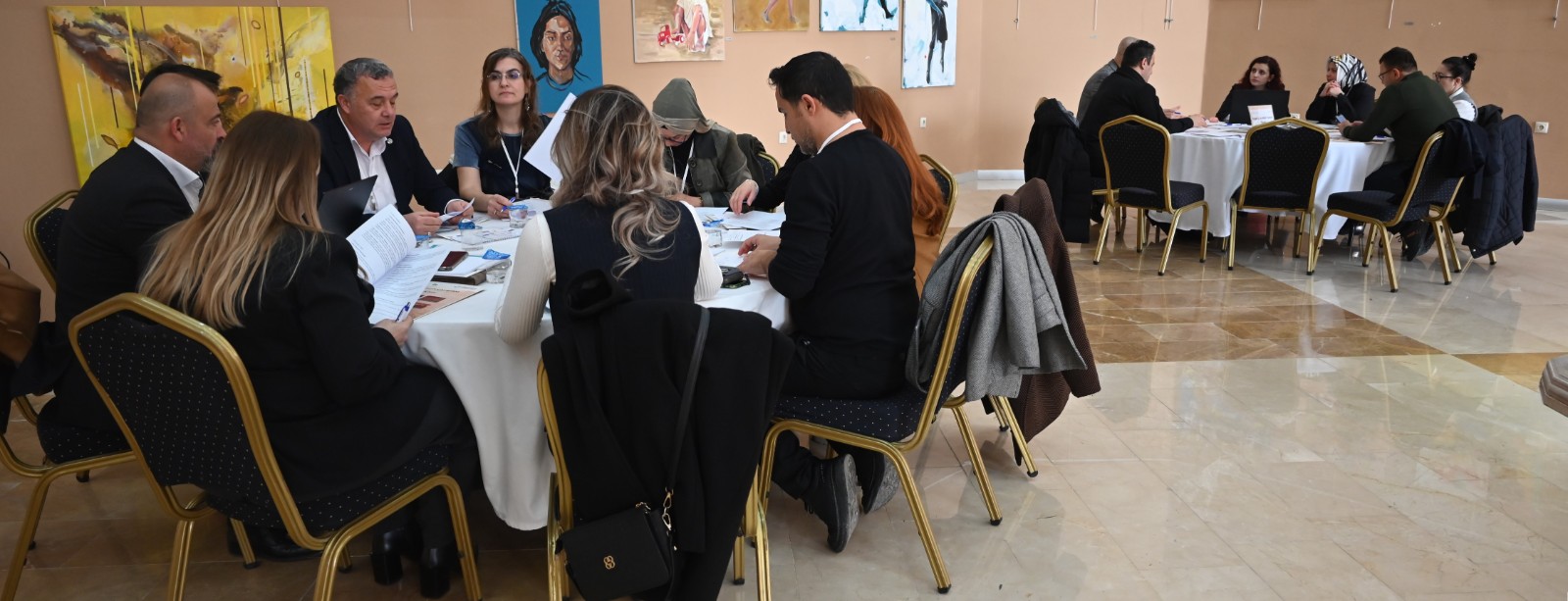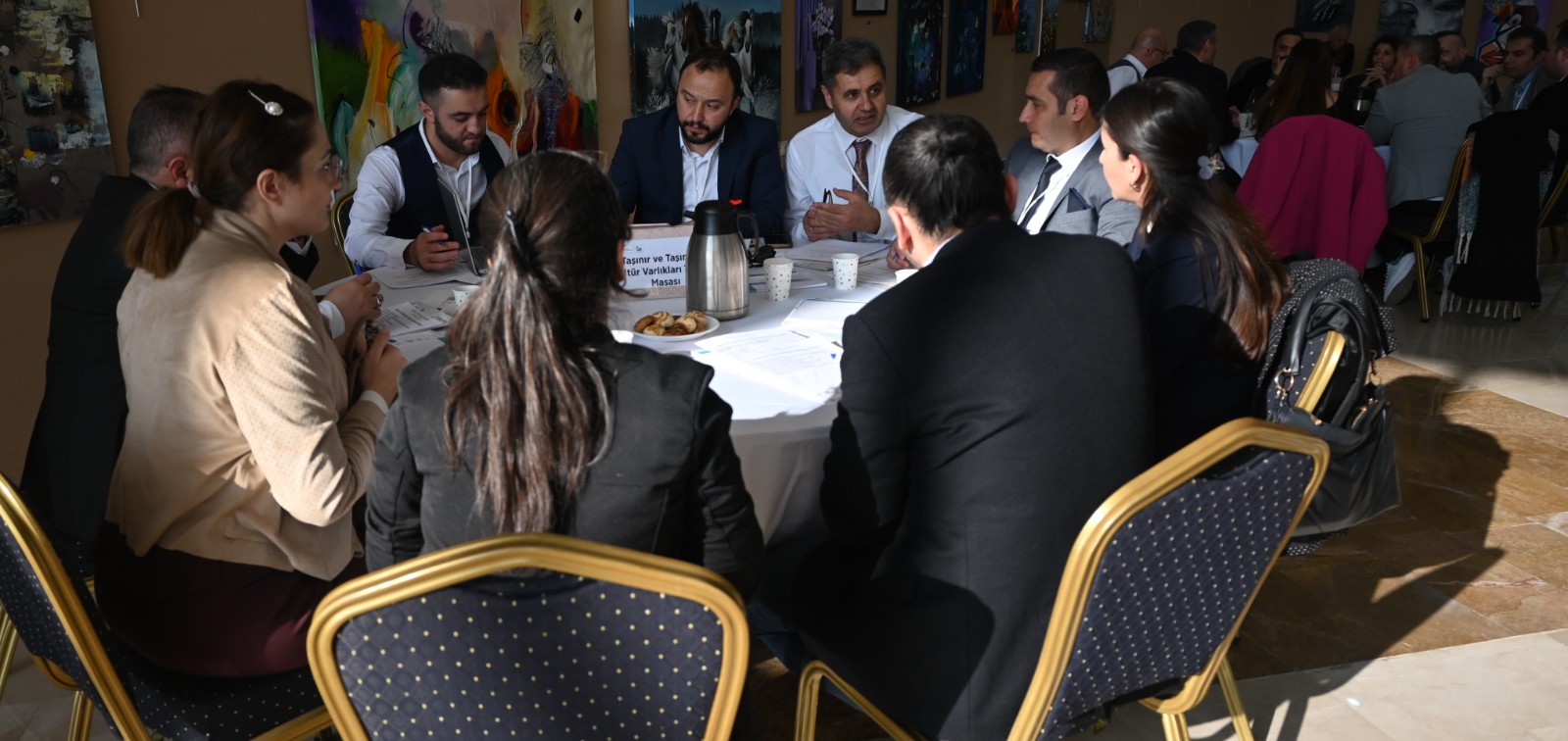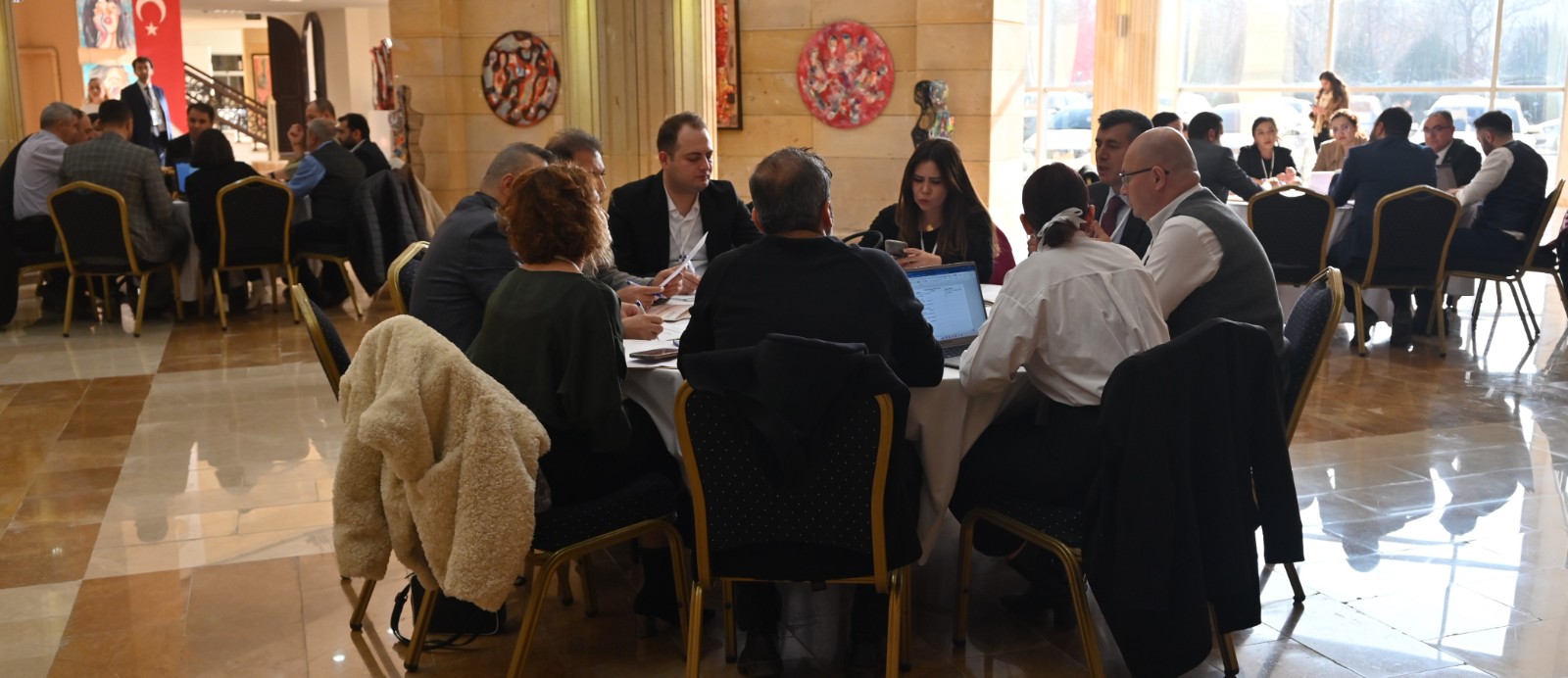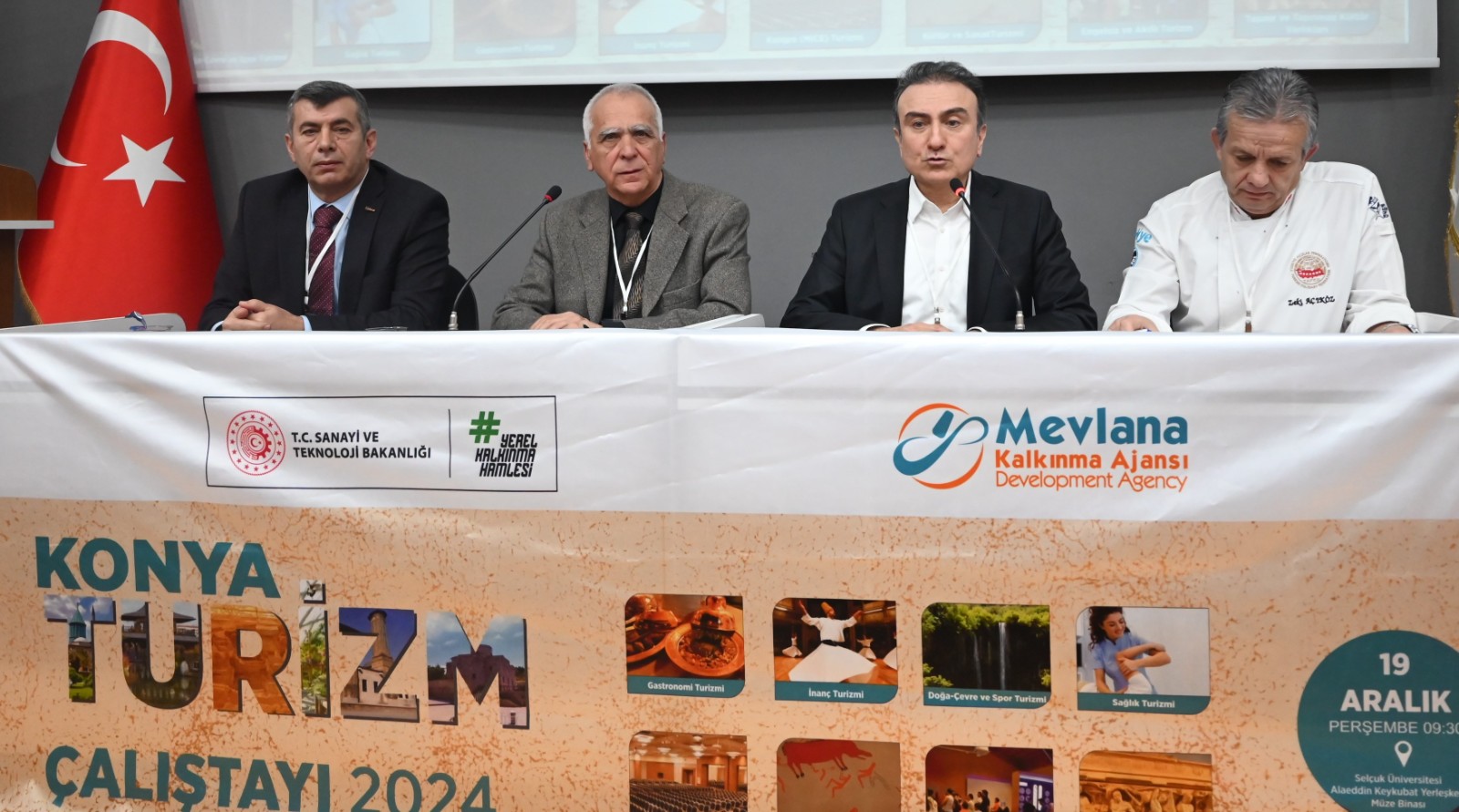New Roadmap for Konya Tourism to be Prepared Under MEVKA's Leadership
Mevlana Development Agency, operating in the Konya-Karaman Region, organized a Konya Tourism Workshop in cooperation with Selçuk University Continuing Education, Application and Research Center.
The program, held at the Selçuk University Museum Building, was attended by Derbent District Governor Bünyamin Miroğlu, Selçuk University Vice Rector Prof. Dr. Haldun Soydal, Mevlana Development Agency Secretary General Dr. İhsan Bostancı, Konya Provincial Culture and Tourism Acting Director Mehmet Yünden, representatives of public institutions and organizations, faculty deans, sector stakeholders, and many guests.
Speaking at the opening of the program, Mevlana Development Agency Secretary General Dr. İhsan Bostancı said, “As we all closely follow, tourism, briefly defined as industry without chimneys, has become an increasingly important field due to providing large amounts of foreign currency inflow to countries' economies, making great contributions to reducing current account deficits and unemployment, and many other reasons we can count. The contribution of the tourism sector, which is at the focus of the development policies of many countries today, to employment and its provision of high added value increases the attractiveness of the sector day by day, and this situation brings competition with it. At this point, the natural beauties, historical heritage, and cultural riches of our country and region offer us great potential in tourism. What is important here is to evaluate this potential in the most correct way and ensure that both our region and our country get a larger share of this pie. In this framework, when we look at our country's tourism data, we see that the tourism income in the first 9 months of 2024 reached 46.9 Billion Dollars, and the number of tourists visiting our country in the first 9 months exceeded 49 million. When the tourism infrastructure of the TR52 Region is examined within the axis of the Konya-Karaman Regional Plan, which was prepared by our Agency with the contributions of our stakeholders in the Konya and Karaman Region, covers the years 2024-2028, and gained validity by being published in the Official Gazette with the approval of our President, it is seen that there are nearly 200 facilities in the region, the total number of hotels in the region constitutes 1.21% of the total number of hotels in Turkey, and the number of beds constitutes only 0.86%. Again, within the axis of the TR-52 Regional Plan, although the Konya Karaman Region has an important and very diverse tourism potential, it has not been able to achieve the desired development in the tourism sector, faith tourism has been prioritized in the region and tourism has not been diversified, and it has been stated that the region can get a larger share from tourism by mobilizing its potentials for tourism. In addition, it has been stated by stakeholders that a large part of the foreign tourists coming to the region come with package programs by tour agencies, and a large part of the incoming tourists visit a few points and leave the region without accommodation due to insufficient accommodation in the region and lack of promotion of other values of the region. Considering both the problems revealed in our regional plan and the world trends observed in the tourism sector; it is an undeniable fact that our region is in great need of renewing itself in tourism with concepts such as increasing competition, technological innovation, service quality, consumer awareness, and satisfaction, as in other sectors. In this context, steps to be taken on issues such as accelerating infrastructure investments for hotels, accommodation facilities, and tourism businesses, creating new destinations by ensuring tourism diversity, making the human resource capacity serving in this field more equipped, increasing promotional activities, highlighting our local values, and adopting a sustainable tourism approach will make our region even stronger in tourism. This can only be achieved if all stakeholders in the region, namely travel agencies, tourism businesses, private sector representatives, public institutions, civil society organizations, universities, local actors, in short, all stakeholders, take responsibility and put forward a common vision. In this direction, as Mevlana Development Agency, I would like to state once again in your presence that we are ready to do our best in light of the concrete suggestions that will emerge from today's workshop for our region to get a larger share from tourism revenues. As Mevlana Development Agency, under the leadership of our board of directors and in coordination with the Ministry of Industry and Technology General Directorate of Development Agencies, we continue our efforts to guide the development of our region and contribute to this development process through financial and technical support programs for businesses, public institutions, and civil society organizations in Konya-Karaman provinces, as well as plans and reports we prepare on various subjects. In this direction, our Agency has provided approximately 3 Billion TL support at 2024 prices to 1600 financial and technical support projects since our establishment, mobilizing an investment of 5.5 Billion TL in our region with co-financing. Regarding tourism, which brings us together today; Within the scope of financial and technical support programs carried out to develop tourism in the region within the priorities included in our regional plans, our Agency has provided approximately 400 Million TL support at 2024 prices to 135 projects to date, mobilizing an investment of 750 Million TL in the region with beneficiary co-financing. All of these 135 implemented projects are valuable to us and contribute to the tourism of our region, however; The Çatalhöyük Neolithic City, which is on the UNESCO World Heritage List and was supported within the scope of our Agency's Guided Project Supports and implemented by our Konya Metropolitan Municipality, has a special place for our Agency and our tourism community. Within the scope of this project, to which our Agency allocated approximately 50 Million TL, a reception center was built to make Çatalhöyük an important tourism attraction center and has recently been opened to visits by domestic and foreign tourists. I thank our Konya Metropolitan Municipality for bringing such a work to the tourism of our city. In 2024, our Agency underwent a new structuring, and one of the units we established within this structuring was the Rural Development and Tourism Unit, one of whose main themes is the tourism sector. We will now carry out projects and studies that will add value to the tourism infrastructure of our region in a more focused manner under the coordination of this unit. On this occasion, I would like to state that our Tourism Technical Support Program, carried out under the auspices of our Rural Development and Tourism Unit, is currently open, and we expect project applications from you, our esteemed tourism stakeholders. With this workshop, organized in cooperation with our Agency and Selçuk University Continuing Education, Application and Research Center, which brings together all stakeholders of tourism, we aimed to bring sector stakeholders together to produce solutions to the problems we experience in tourism with a common mind, and to develop new ideas and new projects. In the panel part of our workshop, topics such as Konya as a Health Tourism Destination, Trends, Needs and Future Perspectives in Gastronomy Tourism, and New Branding and Marketing Strategies in Konya Tourism will be discussed in detail, and then issues such as gastronomy tourism, faith tourism, nature-environment-sports tourism, health tourism, congress tourism, culture and art tourism, accessible and smart tourism, and our movable and immovable cultural assets will be discussed in focus group meetings from the perspective of the region, and a roadmap will be established to create the vision of our region's tourism. With these feelings and thoughts; I thank başta Selçuk University Continuing Education, Application and Research Center Director Prof. Dr. Erkan Akgöz, our panelists, and all our stakeholders for their valuable cooperation in organizing the workshop, and I hope that our workshop will bring beneficial results for regional tourism and our country.”
Then, Selçuk University Vice Rector Prof. Dr. Haldun Soydal, who came to the podium, emphasized that tourism is of great importance in terms of economic development and foreign currency inflow, that Turkey's cultural and natural riches are not sufficiently utilized, and that a change in vision is needed to increase the region's tourism revenues to higher levels, saying, “We have an international value like Hz. Mevlana; we host thousands of tourists in our city for a week during the commemoration ceremonies. At this point, we have to address issues such as what can be done for faith tourism, which destinations can be created, which values can be highlighted; what can be done in terms of gastronomy, digitalization, and promotion, and produce solutions to the problems experienced in this field. Creating new tourism routes by mobilizing the dynamics of our districts in terms of natural, historical, cultural, and architectural aspects will allow domestic and foreign tourists to stay longer in our city. This will directly pave the way for an increase in our tourism revenues.”
After the opening speeches, in the panel part of the workshop chaired by Mersin University TURAK Member Prof. Dr. Celil Çakıcı; “Konya as a Health Tourism Destination” by Konya Health Tourism Association President Dr. Mehmet Portakal, “Trends, Needs and Future Perspectives in Gastronomy Tourism” by Turkish Chefs Federation President Zeki Açıköz, and “New Branding and Marketing Strategies in Konya Tourism” by TÜRSAB Konya Regional Representative Board President Özdal Karahan were discussed in detail.
After the panel sessions, focus group meetings were held where issues such as gastronomy tourism, faith tourism, nature-environment-sports tourism, health tourism, congress tourism, culture and art tourism, accessible and smart tourism, and movable and immovable cultural assets were discussed from the perspective of Konya tourism by sector stakeholders, representatives of public institutions and organizations, and academicians.
It is aimed that the outputs obtained from the workshop organized by Mevlana Development Agency will be reported in a short time, the problems experienced in regional tourism will be presented with solution proposals, and a new roadmap for Konya tourism will be determined.


